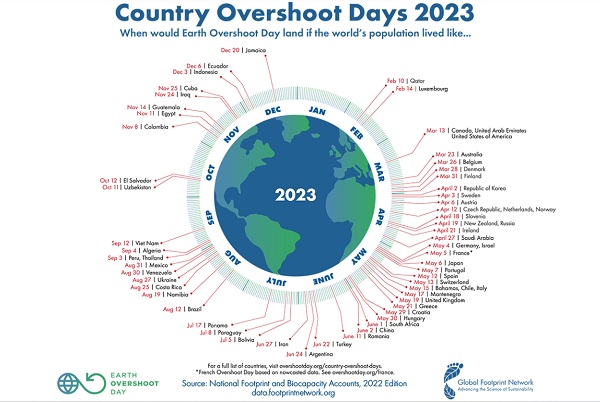
The Global Footprint Network is sounding the alarm: Today marks the point in the year when humanity has used up all the natural resources that are actually available to it for the entire year.
According to Greenpeace Luxembourg, as the impact of our economic growth intensifies year after year, our planet is on fire. "Priorities must finally be reconsidered and concrete solutions brought about". Greenpeace is pushing for an economic system that focuses on sufficient supplies and not the pursuit of profit.
Earth Overshoot Day confirms once again that humanity is in the process of exceeding its natural resource requirements and the limits of the planet many times over. As a reminder, Luxembourg already reached this limit on 14 February this year! "For a chance for a sustainable future, it must be clear that the environment, people, society and economy are all interconnected and interdependent".
According to Greenpeace Luxembourg, the excesses of human production, which feed a seemingly insatiable consumption, are manifested in the destruction of the world's ecosystems and in climate change. The consequences are catastrophic (droughts, fires, floods...) and have worsened in recent years. At the beginning of July, new heat records were set almost daily, while flames and extreme temperatures ravaged the Mediterranean region. Even in Luxembourg, the effects of climate change can be felt: diseased forests and rapidly declining biodiversity are among the consequences of abnormal drought periods, which are occurring more and more regularly.
According to Frédéric Meys of Greenpeace Luxembourg, "It is time to rethink our mainly growth-oriented economic system and switch to an alternative model in which the well-being of all is more important than the exploitation of natural resources. Furthermore, one of the principles of tax reform "The polluter pays" principle to enable a redistribution of wealth while preserving the health of our planet. Chief among the biggest polluters are fossil fuel companies and sections of the elite responsible for the extreme weather events we suffer."
Greenpeace is calling for ambitious solutions to meet the current challenges. "This is to be done through the development of a true circular economy, in which reducing the environmental impact of human activities is a priority and the economic system is geared towards sufficiency rather than profit".








